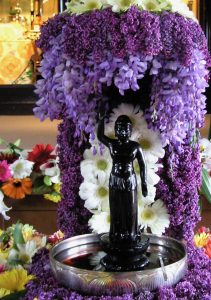
Today, April 8, is when we commemorate the Buddha’s birth. Typically we hold a special service called Hanamatsuri on this day, or a Sunday closest to this date. It’s usually our most festive service of the year. Unfortunately because of the Covid-19 pandemic, services have been cancelled or limited to online participation only.
Please check with your local temple for the latest updated schedules and announcements.
The Buddha was born about 2,600 years ago in Lumbini, which now is part of present day Nepal. Commonly called by his clan name, Shakyamuni, or his family name Gautama, his life, teachings and actions are the source for today’s world religion called Buddhism.
In Asian countries, especially in Mahayana Buddhism, his birth is typically observed on the eighth day of the fourth month, which varies depending on either the lunar or solar calendar. In Jodo Shinshu Buddhism, the Buddha’s birthday is celebrated on April 8. Services are held that day, or a Sunday close to that date.
At our Higashi Honganji temples, the Buddha’s birthday is called “Hanamatsuri,” which in Japanese means “flower” (hana) “festival” (matsuri), representing the myriad of flowers that bloomed in the garden when the Buddha was born.
Our Hanamatsuri services are usually lively affairs, with children’s activities, such as skits, special flower decorations, guest speakers, stories of the Buddha’s life, food and refreshments. There’s also a special offering, in which attendees pour “sweet tea” over a statue of baby Buddha, representing the light rain that fell the day of his birth.
Other major events in the Buddha’s life are also commemorated with special services at our temples, such as Bodhi Day (the Buddha’s enlightenment) in December, and Nirvana Day (the Buddha’s passing into parinirvana) in February.
In Theravada Buddhism, the Buddha’s entire life is celebrated as Vesak in the Spring, on a date that differs depending on the lunar calendar.
In Jodo Shinshu, Amida Buddha stands at the center of our altars. Amida Buddha represents infinite wisdom and compassion—the essence of Shakyamuni Buddha’s teachings. Thus, our focus is on those great truths and teachings, rather than the person.
In this way, the Buddha’s birth represents our own birth as spiritual seekers. We too aspire to awaken to great Truth, just like the Buddha, and seek to lead productive and meaningful lives that help others.
In following this path, we acknowledge the Buddha as Great Teacher and someone to whom we owe our gratitude. At Hanamatsuri services, we pay tribute to his life and teachings and express our appreciation.

